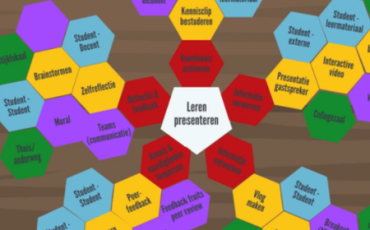Deze maand: de effectiviteit van blended learning meten
Natasa Brouwer heeft het derde artikel in deze reeks voor je uitgekozen. Natasa is senior consultant bij de het Teaching and Learning Centre van de Faculteit der Natuurwetenschappen, Wiskunde en Informatica van de Universiteit van Amsterdam (UvA).
Het artikel van de maand mei: Ma, L., & Lee, C. S. (2021). Evaluating the effectiveness of blended learning using the ARCS model. Journal of Computer Assisted Learning, 37(5), 1397-1408.
https://doi.org/10.1111/jcal.12579
Wat je in dit artikel leest
Dit artikel beschrijft een onderzoek naar het effect van blended learning vanuit een multidimensionaal perspectief op basis van het ARCS-model voor motiverende instructie (Keller, 1987)1. ARCS staat voor Attention, Relevance, Confidence, and Satisfaction, volgens Keller vier belangrijke voorwaarden om gemotiveerd te raken voor leren en om te blijven leren.
De onderzoekers vergelijken de effectiviteit van telkens dezelfde cursus die door dezelfde docent wordt gegeven, maar op drie verschillende manieren: face-to-face, online en blended. De deelnemers werden willekeurig aan een cursusvorm toegewezen. Aan het einde van de cursus vulden de deelnemers een vragenlijst (op basis van het ARCS-model) in, werden de resultaten statistisch verwerkt en zijn er vervolggesprekken gevoerd.
Waarom we dit artikel hebben geselecteerd
Interessant aan deze studie is het bewijs voor de effectiviteit van de blended onderwijs-setting waarbij rekening wordt gehouden met de motivatiebehoeften van studenten. Het onderzoek vergelijkt de effectiviteit van blended, face-to-face en online ontwerp. Dit artikel beschrijft de onderzoeksopzet van een gerandomiseerd gecontroleerd experiment. Door het controleren van externe factoren kunnen de onderzoekers het effect van de verschillende ontwerpen definiëren.
De onderzoeksvraag luidt: Hoe effectief is blended learning in het verbeteren van de academische prestaties en motivaties voor het leren in vergelijking met puur online leren en face-to-face leren? Dit artikel bevat daarnaast een overzicht van literatuur over de effectiviteit van blended learning en het onderzoek vergoot het inzicht in de evaluatie van onderwijs.
Hoe sluit dit aan op jouw onderwijspraktijk?
Vraag 1: Deze studie beargumenteert waarom blended learning moet worden toegepast in een post-covid periode. Hoe denk jij daarover?
Vraag 2: Hoe worden cursussen bij jouw instelling geëvalueerd? Wordt deze multidimensionale benadering gebruikt bij het evalueren van cursussen? Waarom (niet)?
Welkom om je gedachten hier te delen!
Kennis over blended learning opdoen
De Special Interest Group (SIG) Blended Learning en de Vraagbaak Online Onderwijs hebben de handen ineen geslagen. Elke maand selecteren deze twee SURF-communities speciaal voor jou een relevant wetenschappelijk artikel over blended learning dat interessant is om te lezen. We stellen je een prikkelende vraag en we stimuleren je om naar je onderwijs / omgeving te kijken en je kennis en ervaring te delen. We vinden het geweldig als je jouw antwoord hieronder of op LinkedIn met ons wil delen!
- Lees hier deel 1 in deze serie over docentstrategieën voor betrokkenheid.
- En lees hier deel 2 over peerfeedback bij blended learning.
Foto door William Warby via Unsplash
The science behind Blended Learning | Part 3: Evaluating the effectiveness of blended learning
Blended learning is one of today’s main topics in higher education. A lot of research on the topic has been conducted over the past years which gives us the opportunity to look at what evidence there is. But it can be daunting. With so many scientific articles, so much information…where to start and what to read? No worries, we’ve got you covered. Each month we’ll pick one scientific paper on blended learning to get you started on expanding your knowledge on the topic.
This month: Evaluating the effectiveness of blended learning
Natasa Brouwer chose the third article in this series. Natasa is a senior consultant at the Faculty of Science Teaching and Learning Centre at the University of Amsterdam.
The article of the month of May is: Ma, L., & Lee, C. S. (2021). Evaluating the effectiveness of blended learning using the ARCS model. Journal of Computer Assisted Learning, 37(5), 1397-1408.
https://doi.org/10.1111/jcal.12579
What to expect in this article
This article describes an investigation of the effect of blended learning from a multidimensional perspective based on the ARCS model for motivational instruction (Keller, 1987)1. The ARCS stands for Attention, Relevance, Confidence, and Satisfaction, according to Keller four major conditions to become motivated to learn and to continue learning. This article compares the effectiveness of the same course taught by the same lecturer in three different ways: face-to-face, online and blended. The participants were randomly assigned. At the end of the course, the students answered a questionnaire based on the ARCS model and the results were statistically processed. In addition, follow-up interviews were conducted.
Why we think this article is a must-read
This study provides evidence on the effectiveness of the blended learning educational setting taking into account the motivational needs of students. The research compares the effectiveness of blended, face-to-face and online course design. This article describes a randomized controlled experiment. The effect of the different designs could be defined by controlling external factors. The research question in this article is: Comparing to pure online learning and face-to-face learning, how effective is blended learning in enhancing students' academic performance and learning motivations?
This article contains a literature review on the effectiveness of blended learning. It also increases insight into educational evaluation.
How does this align with your teaching practice?
Question 1: Think about on how this study supports its argument for why blended learning should be applied in a post-Corona-19 period?
Question 2: How are courses evaluated at your institution? Is this multidimensional approach used anywhere in course evaluation? Why (not)?
Welcome to share your thoughts here!
Gaining more scientific knowledge on blended learning
SURF’s Special Interest Group (SIG) Blended Learning and Vraagbaak Online Onderwijs will be working together from now on. Each month they will provide you with a relevant article on blended learning and an inspiring question. Easy, accessible and up to date. We invite you to share your thoughts on the selected articles either here or on LinkedIn.
Previous articles in this series:
- Part one: strategies to foster student engagement
- Part two: peer feedback in a blended learning environment
Photo by William Warby via Unsplash



0 Praat mee